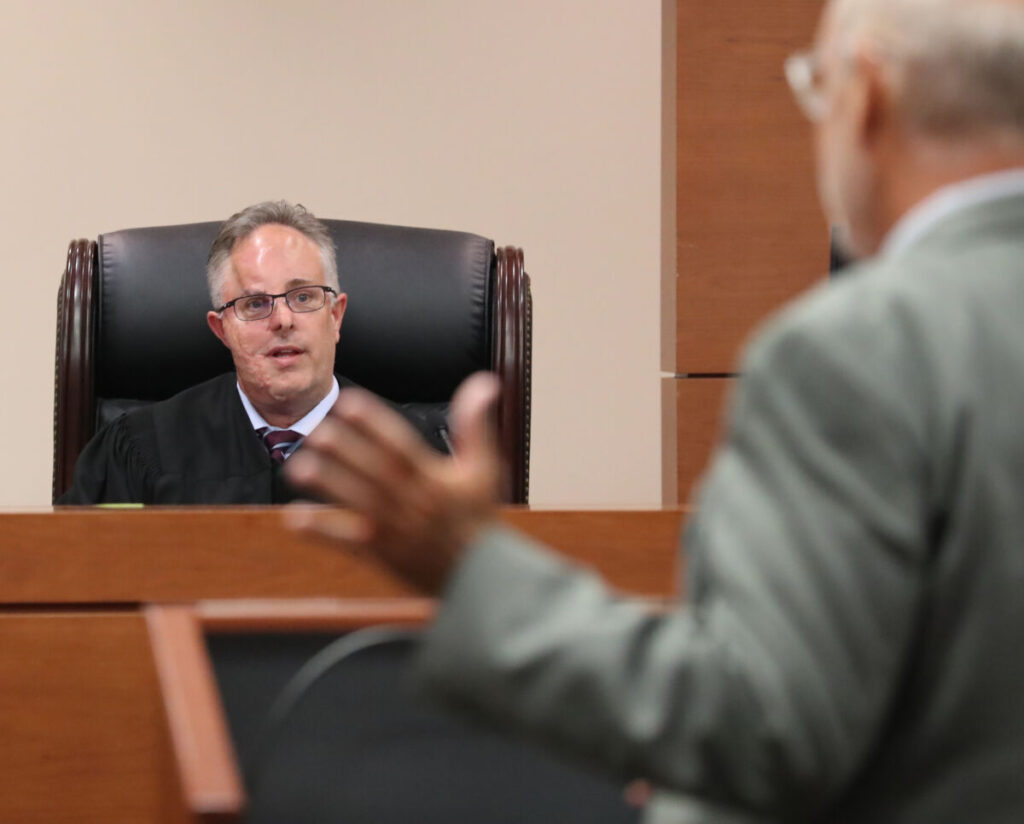Fourth appeal filed in the fire fee case

File photo: Judge Robert Hodges listens to George Franjola raise objections to attorneys fees during the May 10, 2022 hearing at the Marion County Judicial Center. [Bruce Ackerman/Ocala Gazette] 2022.
A fourth appeal of the court ruling involving $80 million in refunds to Ocala Utility customers has been filed, this time by a resident in a unique situation. He is both a class member of the group that sued Ocala over fire fees and was a lawyer with the firm that defended the city during the long-running dispute.
Attorney George Franjola, who worked on the case from 2014 through May 2020 while he was with the city’s firm of Gilligan Gooding Batsel Anderson & Phelan P.A., is challenging the way the legal fees are being determined.
Franjola told the Gazette that he never opted out as a claimant in the suit while simultaneously working as an attorney for the city defending the case. He left the law firm in May 2020 and says he did not discuss with his former colleagues the appeal he has filed as an individual.
The case stems from a class-action suit filed in 2014 over the roughly $15 a month that more than 89,000 Ocala residents and businesses paid for fire services as an add on to their Ocala Electric Utility bills. During the trial, the city’s attorney argued Ocala implemented the tax in 2006 to spread the cost of fire services across a broad group of citizens, some of whom would not typically be paying them because they didn’t own real property or were tax-exempt. An appellate court found the fees constituted an illegal tax, and a judge ordered the city to refund the nearly $80 million in fees that was collected from utility customers over the eight years.
Franjola’s appeal focused on a specific part of the final order entered on May 16 by Marion County Circuit Judge Robert W. Hodges in which he awarded legal fees of nearly $6.4 million (approximately 8.06% of total refunds) to Bowen|Schroth, the firm that represented the Ocala’s utility customers who paid the illegal tax during the eight years of litigation.
In the order, Hodges outlined factors he considered in determining reasonable attorneys’ fees, including the “novelty and difficulty of the question involved.” The case was unique in that this issue had not been considered or decided by a higher court.
The Florida Bar explained in 2019 article how attorney’s fees and a multiplier should be calculated. First, the court determines a reasonable number of billable hours. Next, the court determines a reasonable hourly rate.
Bowen|Schroth took the case based on a contingency fee agreement that only entitled them to compensation if they were successful in their efforts for the plaintiffs. In those cases, the court can consider a “contingency risk factor” that would provide for a multiplier of the attorney’s fees.
Franjola’s appeal focuses on this fee multiplier.
Franjola told the Gazette he does not view his individual role in the case as a conflict of interest because the claimants aren’t the “real parties in interest” in cases like this.
The appellate court has ordered that the city of Ocala be included in Franjola’s appeal. However, Franjola said the city has no interest in how much money the class members must pay in legal fees, so he is not adversarial with the city, and his appeal does not pose a professional conflict of interest between him and his former client.
“I think this is an appeal with some merit that will benefit the poor taxpayers of Ocala who are bearing the burden of this misguided effort,” stated Franjola.
Speaking to the ups and downs throughout the six years he worked on the case, Franjola said,“I won three times in the [local] trial court and lost three times on appeal.”
“I need to win one of these times, don’t you think?” Franjola added with a chuckle.
The objections of Franjola have not stopped the city from disbursing attorney’s fees ordered by the court to Bowen|Schroth and starting the claims process to get refunds to residents and businesses.
In the same May 16 ruling, Hodges ordered the city hold aside $100,000 in anticipation of attorneys for the customers incurring more attorneys’ fees.
If the time records from the first three appeals presented during the May 10 hearing are any indication of how time-intensive these appeals have been for the attorneys for the class, Franjola’s latest appeal may eat up a good portion of that fund the court set aside.





